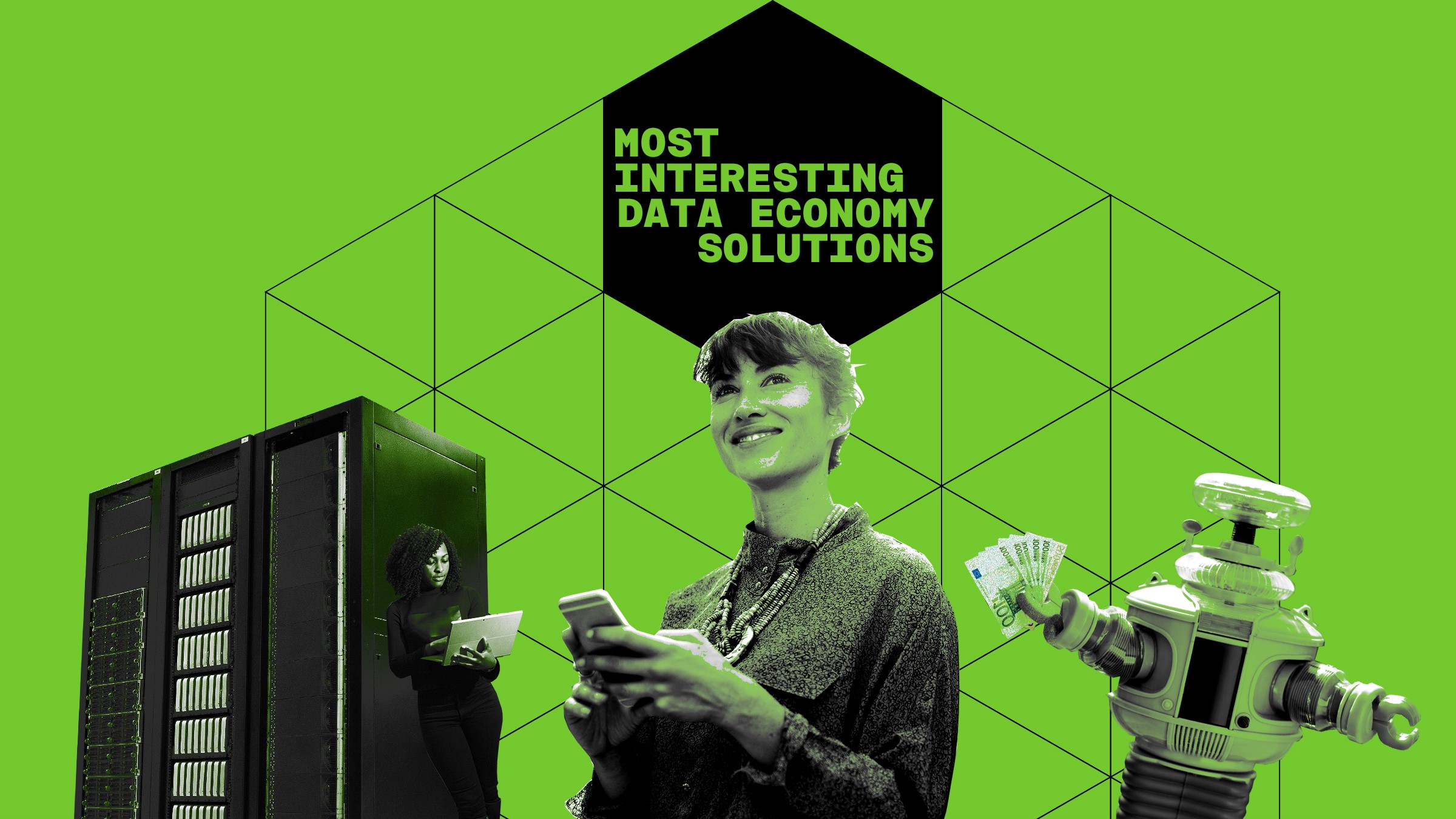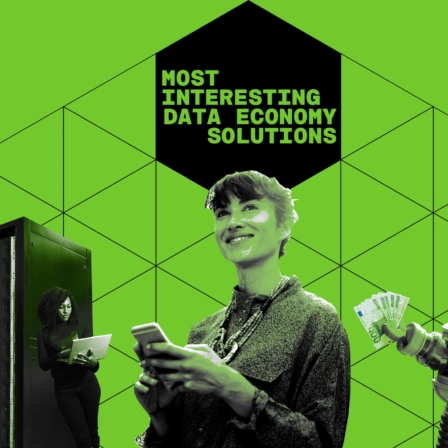Sitra, the Finnish Innovation Fund, has published the first-ever list of the ‘Most Interesting Data Economy Solutions in Finland‘, which showcases 24 varied data economy solutions.
A total of 76 solutions were submitted, from which a panel of data economy experts selected a variety of groundbreaking data use solutions. Sitra encourages everyone to develop new business models and services that use data to improve everyday life.
All solutions on the list
Biocode – calculates and visualises the carbon footprint of the food chain
DigiOne – unifies fragmented school systems and reduces teacher workload
Eduten – data-driven, personalised maths tasks improve learning outcomes
Fair Data Economy Rulebook – ensures secure data sharing
Finnish Meteorological Institute – satellite monitoring of carbon emissions and the carbon cycle to develop a tool to track countries’ emission reductions
Geo E3’s Location Europe – brings together national geospatial data, meteorological data, and statistical information from different countries on one platform
IOXIO – provides data sharing tools to generate new business
K Group’s wellbeing service – gives structured and visualised purchase data back to consumers
Materialisting – helps builders make more sustainable material choices
Ministry for Foreign Affairs’ Virtual Finland project – digital service path for immigrants
Nordic Smart Government joint experiment – digitally starting a business in another country
Port Activity app – shares real-time data about ships and ports with maritime operators
Prifina solution – managing personal health and fitness data in your own data cloud
Privaon’s cloud service – provides a model and tools to ensure data protection
Reliable Worker Service – the Vastuu Group’s service enables jobseekers and providers to meet more efficiently
S Group’s My Purchases service – gives structured and visualised purchase data back to consumers
SIX Mobile Machines cluster – sharing data from industrial batteries between battery manufacturers, users and recyclers
Smart factory trial – Konecranes, Danfoss, and Fastems’ manufacturing industry trial demonstrated the benefits of data sharing
Suomisport – automates tasks for sports clubs and associations and produces data for sports research
Telia Crowd Insights – provides data on people flows to support decision-making
Traffic Data Ecosystem – Fintraffic promotes the development of traffic and transport
Tritom data transfer service – companies and research institutions exchange data securely and reliably
University of Vaasa’s Spacecasting project – uses satellite data to predict business success or assess sustainability
Virtual Finland Testbed – companies and public institutions test data sharing for free on the platform
Services for Consumers
Luotettava työntekijä (Reliable Worker Service) – job searches streamlined by allowing employees to share their information with recruiters in seconds
Luotettava työntekijä, or The Reliable Worker service, developed by the Vastuu Group, enables job seekers to share their own information easily and securely between different registries and employment and training services.
This service helps jobseekers and employers find each other more easily. At the same time, it creates a network between job seekers, employment services, employers, and training providers, where all parties benefit from the sharing of information. The jobseeker can decide what information about them the service can access and to which parties it can be shared.
This solution eases the job search and skills development process, bringing together jobseekers, employers, employment support services, and training providers.
Eduten – AI as a tool for mathematics studies
Teachers have limited time to provide personalised tasks to each student. Eduten, a research-based training platform enhanced with artificial intelligence, keeps students engaged with appropriate tasks and improves learning outcomes.
The Eduten platform is based on the ViLLE environment developed at the University of Turku, which is familiar to Finnish school students and is now offered to learners worldwide. The sensible and ethical use of AI enhances learning, in accordance with Finnish data protection standards.
Suomisport – facilitating the daily routine of the sports community with a common platform
Finnish sports clubs are mainly run by volunteers. In 2015, associations and clubs asked the Finnish Olympic Committee to ease their administrative burden. This led to the creation of the Suomisport service to ease the daily routine of the sports community, with the aim of reducing administration and allowing more time for sports. Sports associations and clubs can use the platform to manage their activities, develop club functions, and generate data for research and elite sports.
The use of this platform ensures that athletes’ personal data is processed in accordance with data protection regulations, moving away from paper-based systems on the sidelines and spreadsheets. It also leads to the generation of new types of information about sport.
Prifina – Securing personal data from wellness apps into data clouds
In many wellness applications, a user’s personal data remains under the control of the app or software company. Prifina offers a fairer solution where individuals can manage their own health and fitness data through their personal data clouds.
This solution aims to encourage companies in the wellness industry to develop new services based on individual data, operating securely within users’ data clouds. It broadens consumer choice by introducing a Finnish application to the market, where the information collected from wellness apps does not remain with the app provider.
Data from purchases – customers access purchase data collected by grocery loyalty programmes
Grocery stores and speciality stores collect vast amounts of data about their customers through loyalty programmes. Finland’s largest grocery chains, K-Group and S-Group, return this data to their customers in a processed, informative format.
Customers can use this information, if they wish, to analyse their consumption habits or to choose healthier or more sustainable products.
Services for businesses
Space data – satellite data provides real-time insight into the atmosphere and environment
Analysis of satellite data provides objective measurement information about the state of the atmosphere, nature, and the built environment, in near real-time.
Finland has world-class expertise at the National Satellite Data Centre in Sodankylä in using data collected by both commercial and publicly funded satellites for new uses. By combining different data sources, reliable models can be created, for example for measuring carbon dioxide emissions or predicting business success, as the University of Vaasa is doing.
Telia Crowd Insights – information on people flows helps decision-making
Where is the best place to open a café? How many people pass through a certain area? Statistics that are even a year old can be outdated for many entrepreneurs. Mobile operator data, on the other hand, can offer reliable and up-to-date information on crowd movements.
Mobile operators have a large amount of data on people flows. The Telia Crowd Insights service is an example of how anonymised data on people flows is packaged into a data product that has a market.
Port Activity App – sharing information to smooth maritime traffic and reduce emissions
An app developed at Satakunta University of Applied Sciences increases the efficiency of port operations. With this app, everyone in the port and on board the ship knows the dock where the ship is going to berth, what time it will arrive, and what kind of cranes or other machinery will be needed for loading or unloading. Used by more than 20 ports in the Baltic Sea, the app also aims to reduce carbon emissions from shipping.
Materialisting – information on the entire lifecycle of building materials helps make sustainable choices
Construction is a major contributor to global greenhouse gas emissions and waste. Materialisting, based in Joensuu, is a platform service for construction professionals that helps to compare the climate and environmental impacts of building materials.
Services that promote the green transition are essential in the construction industry. Services that improve the availability and understanding of environmental data on building materials contribute to the change that evolving legislation is also aiming for.
Privaon – technology helps businesses adapt to regulation
Regulation of digital technologies and services is increasing. Privaon offers a regulatory technology (regtech) solution that helps organisations comply with rules and regulations.
As regulation continues to evolve, the need for such solutions is likely to increase as they help companies and organisations operate in a way that is required by regulation.
Biocode – a simpler way for agri-food companies to calculate and report their carbon footprint
The new Sustainability Reporting Directive requires companies to report emissions from their operations and value chain in their financial statements. Calculating greenhouse gas emissions, which is included in this reporting, has been particularly challenging for smaller organisations.
Biocode is a carbon footprint calculator for food industry companies, producers and farmers. It measures and reports the carbon footprint of the food chain, making it easier to calculate the carbon footprint of a product over its entire life cycle.
Other organisations are developing similar calculators, often for their own subcontracting networks. Biocode brings a similar solution to a wider audience.
GeoE3 Platform, Location Europe – enriched geospatial data for the whole of Europe available to businesses
Developed for use by businesses and public authorities, this platform collects meteorological, statistical, and geospatial data from various European countries. Solving complex problems requires up-to-date, reliable, and easily combinable data.
Combining and enriching data produced by different institutions enables a variety of solutions needed to advance the green transition across industries and national borders.
Infrastructure solutions
Smart factory model – a prototype of a smart factory where devices from different manufacturers exchange data
In a modern factory, there are devices from many manufacturers that need to work together seamlessly. In the Smart Factory model, these devices exchange data with each other according to European standards, facilitating factory production and the development work of individual manufacturers.
In a trial led by the co-creation ecosystem DIMECC, based in Tampere, devices from Danfoss, Konecranes and Fastems, managed by the Technical Research Centre of Finland (VTT), successfully communicated with each other. This paves the way for the composition of future smart factories and the production of compatible components.
Fair Data Economy Rulebook and Traffic Data Ecosystem – smoother traffic for all through shared data and common rules
In Finland, transportation sector stakeholders have formed a common data ecosystem, a collaborative network for sharing data. Traffic becomes smoother by combining different types of information from different stakeholders, but such collaboration requires common rules. The Data Economy Rulebook model has established common rules for transport and other industries.
The importance of the data ecosystem will only increase as EU data spaces are completed. It is beneficial for companies to understand how they can participate in these collaborative models.
IOXIO and DataSpace Europe – ready-made solutions to help SMEs enter the data economy
Shared data is a raw material that is not yet widely used in companies’ product development, in the streamlining of public services for users or in new innovations.
IOXIO’s solution involves creating a reliable data-sharing information space for use within a specific industry and across different industries. DataSpace Europe’s Tritom data transfer services ensure that data from businesses of all sizes is moved and used within the data space in an agreed and trusted manner.
Virtual Finland testbed – a free environment for testing data sharing
Virtual Finland testbed is a publicly funded platform for creating and testing data-sharing networks. The platform has been used for pilot projects such as testing industrial battery data sharing, digitally starting a business in another Nordic country and facilitating immigration processes.
This testbed enables businesses and organisations to test use cases related to data sharing for free and with a low entry threshold.
DigiOne – A national platform to unify fragmented school systems
In the education sector, there are multiple systems in use where data can become stuck. Manually transferring data from one place to another takes time away from teaching or planning.
The DigiOne platform is designed to consolidate information, systems and services used by teachers, students, principals, parents and guardians, and school administrators in primary and secondary schools. It also offers a domestic alternative for educational collaboration networks.



